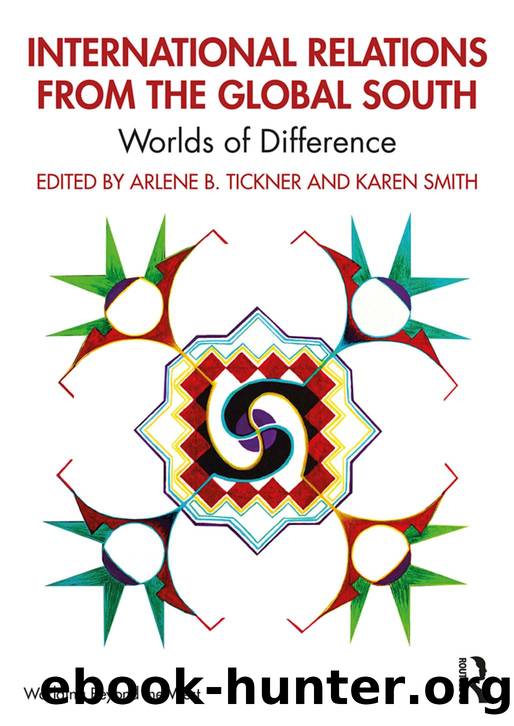International Relations From the Global South: Worlds of Difference by Arlene B. Tickner

Author:Arlene B. Tickner [Tickner, Arlene B.]
Language: eng
Format: azw3, mobi
Tags: ordering and disorder, 3 Where, 5 Order, 6 The international, 8 State and sovereignty, 13 Inequality, when and what is IR?, 1 Introduction: International Relations from the global South, 15 Resistances, 14 Migration, 7 War and conflict, 10 Security, 16 Socio-environmentalism, 4 IR and the making of the white man’s world, secularism and nationalism, 2 The global IR debate in the classroom, 11 Foreign policy, 9 Religion, 12 Globalization, 17 South–South talk
ISBN: 9781138799097
Publisher: Routledge
Published: 2020-06-10T00:00:00+00:00
10 Security
Pinar Bilgin
Introduction: an Ottoman sultan in Paris
In 1867 the Ottoman sultan, Abdülaziz, arrived in Paris to attend the World Fair as Emperor Napoleon IIIâs guest of honor. The Sultanâs visit was a significant occasion not only for his hosts but also for the Ottomans. For it was the first time an Ottoman sultan was traveling to lands outside the empire for reasons other than battle and conquest. Indeed, some at home objected to an Ottoman sultan stepping outside of what they viewed as dar-al-sulh (abode of peace) for reasons other than war-making.
Such objections were warranted by Ottomansâ hierarchical conception of the international which was legitimized by a particular cosmology that placed them at the top vis-Ã -vis all other peoples. More specifically, dar-al-sulh referred to a space where Muslims and other protected peoples enjoyed security. European powers, in turn, were viewed as located on a lower pedestal in relation to the Ottoman self. While this particular cosmology did not mandate war with non-Muslims, it nevertheless underscored the potential for their territories to be conquered sometime in the future.
Needless to say, this hierarchical view of the world hinged on the continuation of Ottoman military superiority vis-Ã -vis their European counterparts. From the 17th century onwards, as the empire experienced one battlefield loss after another, the Ottomans found it increasingly difficult to hold on to their own view of the international. By the time the Paris World Fair took place in 1867, the empire had succumbed to the European society of statesâ view of the international. The latter was another hierarchy that ranked world peoples in terms of so-called âstandard of civilizationâ (Gong 1984) (see Box
10.1). The Ottoman leadership struggled to improve the empireâs position in this hierarchy by reorganizing its bureaucracy and particularly the military. The Ottomans also started attending world fairs to improve their image and claim their place among the
âcivilizedâ (Deringil 2003). The sultanâs visit to the 1867 Paris World Fair was conceived as part of this strategy.
182
Pinar Bilgin
BOX 10.1 STANDARD OF CIVILIZATION
The âstandard of civilizationâ refers to âthe assumptions, tacit and explicit, used to distinguish those that belong to a particular society (by definition the âcivilizedâ)â (Gong 1984: 172). Initially formulated to overcome the obstacles European actors encountered in their dealings with non-Europeans, the standard of civilization also proved instrumental for the former in their colonial dealings.
While those who were altogether outside the society of states (i.e. âless-then-civilizedâ) were considered to be not deserving of self-governance (as with parts of Asia and Africa), others in the process of meeting the standards with a view to joining endured intervention of one form or another (such as China, Japan and the Ottoman Empire; see Suzuki et al. 2014).
Yet, not all in the empire were ready to let go of the Ottoman conception of the international. Some offered an ingenuous solution that would have allowed the Ottomans to hold on to their own conception of the international while at the same time enabling the sultan to leave dar-al-sulh and visit Paris. The
Download
International Relations From the Global South: Worlds of Difference by Arlene B. Tickner.mobi
This site does not store any files on its server. We only index and link to content provided by other sites. Please contact the content providers to delete copyright contents if any and email us, we'll remove relevant links or contents immediately.
The Secret History by Donna Tartt(19086)
The Social Justice Warrior Handbook by Lisa De Pasquale(12190)
Thirteen Reasons Why by Jay Asher(8909)
This Is How You Lose Her by Junot Diaz(6886)
Weapons of Math Destruction by Cathy O'Neil(6279)
Zero to One by Peter Thiel(5801)
Beartown by Fredrik Backman(5754)
The Myth of the Strong Leader by Archie Brown(5507)
The Fire Next Time by James Baldwin(5442)
How Democracies Die by Steven Levitsky & Daniel Ziblatt(5218)
Promise Me, Dad by Joe Biden(5153)
Stone's Rules by Roger Stone(5087)
A Higher Loyalty: Truth, Lies, and Leadership by James Comey(4962)
100 Deadly Skills by Clint Emerson(4925)
Rise and Kill First by Ronen Bergman(4788)
Secrecy World by Jake Bernstein(4753)
The David Icke Guide to the Global Conspiracy (and how to end it) by David Icke(4717)
The Farm by Tom Rob Smith(4507)
The Doomsday Machine by Daniel Ellsberg(4490)
